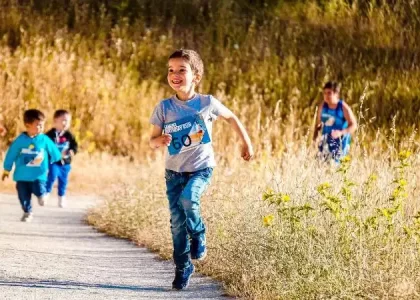What is cognitive development?
Cognitive development means the growth of a child’s ability to think and reason. This growth happens differently from ages 6 to 12, and ages 12 to 18.
Children ages 6 to 12 years old develop the ability to think in concrete ways. These are called concrete operations. These things are called concrete because they’re done around objects and events. This includes how to:
- Combine (addition)
- Separate (subtract or divide)
- Order (alphabetize and sort)
- Transform (change things such as 5 pennies=1 nickel) objects and actions
Ages 12 to 18 is called adolescence. This age group does more complex thinking. This type of thinking is also known as formal logical operations. They include the ability to:
- Do abstract thinking. This means thinking about possibilities.
- Reason from known principles. This means forming own new ideas or questions.
- Consider many points of view. This means to compare or debate ideas or opinions.
- Think about the process of thinking. This means being aware of the act of thought processes.
How cognitive growth happens during adolescence
From ages 12 to 18, children grow in the way they think. They move from concrete thinking to formal logical operations. It’s important to note that:
- Each child moves ahead at his or her own rate in ability to think in more complex ways.
- Each child develops his or her own view of the world.
- Some children may be able to use logical operations in schoolwork long before they can use them for personal problems.
- When emotional issues come up, they can cause problems with a child’s ability to think in complex ways.
- The ability to consider possibilities and facts may affect decision-making. This can occur in either positive or negative ways.
Types of cognitive growth through the years
A child in early adolescence:
- Uses more complex thinking focused on personal decision-making in school and at home
- Begins to show use of formal logical operations in schoolwork
- Begins to question authority and society standards
- Begins to form and speak his or her own thoughts and views on a variety of topics. You may hear your child talk about which sports or groups he or she prefers, what kinds of personal appearance is attractive, and what parental rules should be changed.
A child in middle adolescence:
- Has some experience in using more complex thinking processes
- Expands thinking to include more philosophical and futuristic concerns
- Often questions more extensively
- Often analyzes more extensively
- Thinks about and begins to form his or her own code of ethics (for example, What do I think is right?)
- Thinks about different possibilities and begins to develop own identity (for example, Who am I?).
- Thinks about and begins to systematically consider possible future goals (for example, What do I want?)
- Thinks about and begins to make his or her own plans
- Begins to think long-term
- Uses systematic thinking begins to influence relationships with others
A child in late adolescence:
- Uses complex thinking to focus on less self-centered concepts and personal decision-making
- Has increased thoughts about more global concepts such as justice, history, politics, and patriotism
- Often develops idealistic views on specific topics or concerns
- May debate and develop intolerance of opposing views
- Begins to focus thinking on making career decisions
- Begins to focus thinking on emerging role in adult society
How you can encourage healthy cognitive growth
To help encourage positive and healthy cognitive growth in your adolescent child, you can:
- Include him or her in discussions about a variety of topics, issues, and current events.
- Encourage him or her to share ideas and thoughts with you.
- Encourage him or her to think independently and develop his or her own ideas.
- Assist him or her in setting goals.
- Challenge him or her to think about possibilities for the future.
- Compliment and praise him or her for well-thought-out decisions.
- Assist him or her in re-evaluating poorly made decisions.
SHIJINA RIJESH





